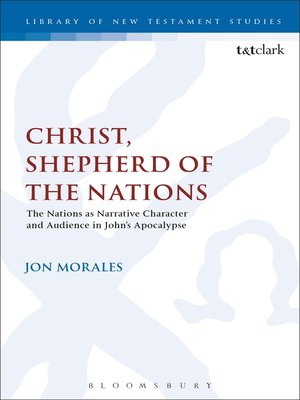Christ, Shepherd of the Nations
ebook ∣ The Nations as Narrative Character and Audience in John's Apocalypse · The Library of New Testament Studies
By Jon Morales

Sign up to save your library
With an OverDrive account, you can save your favorite libraries for at-a-glance information about availability. Find out more about OverDrive accounts.
Find this title in Libby, the library reading app by OverDrive.



Search for a digital library with this title
Title found at these libraries:
| Library Name | Distance |
|---|---|
| Loading... |
Does John's Apocalypse envision destruction or salvation for the nations of the world? Scholarly views on this issue range from extreme (total destruction) to extreme (universal salvation). Jon Morales maintains that the question must be reframed to highlight, not only the destiny of the nations, but also their dilemma within the drama of world history. Using narrative methodology, Morales asks four key questions concerning the nations: What is John's story of the nations? How does he tell this story? What is John's message to the nations? And what is his message to the church concerning the nations?
Literary characters cannot be understood in the abstract, but must be rather discovered sequentially in the development of an entire narrative. The nations in Revelation are no exception. Understanding that previous studies have neglected to situate the nations within Revelation's larger plot, or in interaction with other narrative characters, Morales concludes that John's purpose is to show that the nations belong to God. John achieves his purpose in part by deploying a novel metaphor, virtually unexplored until now – Christ, shepherd of the nations
Literary characters cannot be understood in the abstract, but must be rather discovered sequentially in the development of an entire narrative. The nations in Revelation are no exception. Understanding that previous studies have neglected to situate the nations within Revelation's larger plot, or in interaction with other narrative characters, Morales concludes that John's purpose is to show that the nations belong to God. John achieves his purpose in part by deploying a novel metaphor, virtually unexplored until now – Christ, shepherd of the nations







